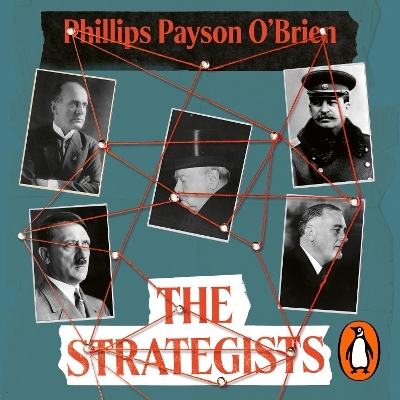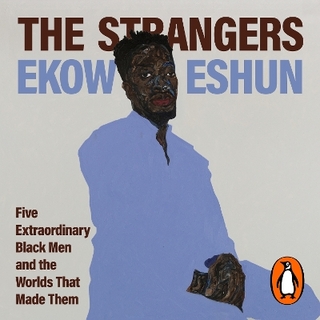
The Strategists
Churchill, Stalin, Roosevelt, Mussolini and Hitler – How War Made Them, And How They Made War
2024
|
Unabridged edition
Penguin (Verlag)
978-1-4059-6805-8 (ISBN)
Penguin (Verlag)
978-1-4059-6805-8 (ISBN)
Brought to you by Penguin.
Churchill. Hitler. Stalin. Mussolini. Roosevelt. Five of the most impactful leaders of WW2, each with their own individualistic and idiosyncratic approach to warfare. But if we want to understand their military strategy, we must first understand the strategist.
In THE STRATEGISTS, Professor Phillips Payson O'Brien shows how the views these five leaders forged in WW1 are crucial to understanding how they fought WW2. For example, Churchill's experiences of facing the German Army in France in 1916 made him unwilling to send masses of British soldiers back there in the 1940s, while Hitler's mistakes on the Eastern Front were influenced by his reluctance to accept that conditions had changed since his own time fighting. The implications of the power of leaders remain with us to this day: to truly understand what is happening in Ukraine, for example, requires us to know what has influenced the leaders involved.
This is a history in which leaders – and their choices – matter. For better or worse.
'Phillips Payson O'Brien is one of our finest historical thinkers' James Holland
© Phillips Payson O'Brien 2024 (P) Penguin Audio 2024
Churchill. Hitler. Stalin. Mussolini. Roosevelt. Five of the most impactful leaders of WW2, each with their own individualistic and idiosyncratic approach to warfare. But if we want to understand their military strategy, we must first understand the strategist.
In THE STRATEGISTS, Professor Phillips Payson O'Brien shows how the views these five leaders forged in WW1 are crucial to understanding how they fought WW2. For example, Churchill's experiences of facing the German Army in France in 1916 made him unwilling to send masses of British soldiers back there in the 1940s, while Hitler's mistakes on the Eastern Front were influenced by his reluctance to accept that conditions had changed since his own time fighting. The implications of the power of leaders remain with us to this day: to truly understand what is happening in Ukraine, for example, requires us to know what has influenced the leaders involved.
This is a history in which leaders – and their choices – matter. For better or worse.
'Phillips Payson O'Brien is one of our finest historical thinkers' James Holland
© Phillips Payson O'Brien 2024 (P) Penguin Audio 2024
Phillips Payson O’Brien is Professor of Strategic Studies at St Andrews. He is the author of How the War Was Won: Air-Sea Power and Allied Victory in World War II and The Second Most Powerful Man in the World: The Life of Admiral William D. Leahy, Roosevelt's Chief of Staff. He has written for The Atlantic, The Spectator and Foreign Affairs, and has a combined following of over 200k on Twitter and Substack. This is his first trade book.
| Erscheinungsdatum | 21.08.2024 |
|---|---|
| Sprache | englisch |
| Themenwelt | Geschichte ► Allgemeine Geschichte ► Neuzeit (bis 1918) |
| Geschichte ► Allgemeine Geschichte ► 1918 bis 1945 | |
| Geschichte ► Teilgebiete der Geschichte ► Militärgeschichte | |
| Sozialwissenschaften ► Politik / Verwaltung | |
| ISBN-10 | 1-4059-6805-2 / 1405968052 |
| ISBN-13 | 978-1-4059-6805-8 / 9781405968058 |
| Zustand | Neuware |
| Informationen gemäß Produktsicherheitsverordnung (GPSR) | |
| Haben Sie eine Frage zum Produkt? |
Mehr entdecken
aus dem Bereich
aus dem Bereich
Five Extraordinary Black Men and the Worlds That Made Them
Audio-Download (2024)
Penguin (Verlag)
18,45 €


